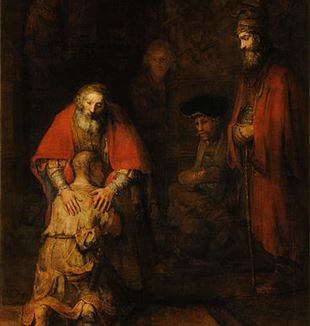
A hope that does not disappoint
A reflection on the relationship between repentance and hope.In his message for Lent, Pope Francis said:
“Let us journey together in hope, for we have been given a promise. May the hope that does not disappoint (cf. Rom 5:5), the central message of the Jubilee, be the focus of our Lenten journey towards the victory of Easter.”
What does repentance have to do with hope? Certainly, one must hope for forgiveness in order to repent—or at least to repent publicly. The Prodigal Son must have been overwhelmed with shame and remorse for how he had lived and squandered his life. Yet, at the same time, he must have been filled with hope—the hope that gave him the courage to rise, to walk back to his father despite his shame. He must have placed his trust in his father’s love, believing that it was greater than his failure.
Hope also plays another incredible role in the dynamic of repentance, as I came to appreciate profoundly when I encountered a few passages from Charles Péguy’s The Portico of the Mystery of the Second Virtue. The French author reflects on the themes of repentance and being lost while meditating on the parable of the lost sheep and the joy in God’s heart when He finds what was lost.
Which man among you, having a hundred sheep
and losing one,
does not leave the ninety-nine in the wilderness
and go after the lost one
until he finds it?
And when he has found it,
he places it on his shoulders, rejoicing.
I tell you,
there will be more joy in heaven
over one sinner who repents
than over ninety-nine righteous people who have no need of repentance.
… What, then, is this extraordinary virtue of repentance,
that surpasses even faithfulness a hundredfold?
… And yet, it is that one, no one else—it is that sheep, that sinner, that penitent, that soul
whom God, whom Jesus, carries back on His shoulders, leaving the others behind.
… What hidden greatness, what incredible source of grandeur is contained in repentance!
… The truth is that human repentance is the fulfillment of God’s hope.
… Because the waiting for this repentance,
the anxious expectation, the hope for this repentance,
has ignited hope in the heart of God.
… For all the others, God loves them in love.
But that lost sheep—Jesus loved it also in hope.
… God has hoped, God has waited for him. God, who is everything, had something to hope for—from him, from that sinner. From that nothingness. From us.
… And just as we ring out Easter bells to celebrate the Resurrection of Jesus,
so too does God, for every soul that is saved, sound for us an eternal Easter.
This truth is deeply reflected in our everyday experiences. I witness it daily in the relationships with my children —I desire and hope, truly hope, for their conversion. Their free and wholehearted conversion in the smallest things: in how they treat one another, in how they respond to love, in how they choose goodness, in how they learn to surrender and ask for forgiveness. It is a hope that awaits the freedom of the other, because our heart deep down knows that "Human fulfillment would not be human - would not be fulfillment - were it not free" ( Fr. Giussani, Chapter 12 of The Religious Sense). And when that hope is fulfilled, it brings immense joy.
It is a Hope that reminds me once again that the truth, which I once encountered and fascinated me, is now encountering my children and friends, drawing them in as well. A truth that exists, works and operates, despite our denials and mistakes. What an overturning of human justice!
What a difference it makes when we become aware of this hope; when we start from hope rather than expectations and demands. It sustains us when we seek forgiveness and when we extend it to others. May this Lent be a time of rediscovering this hope—one that is ultimately fulfilled in the great Easter day, a hope that does not disappoint.
Vittorio, Toronto